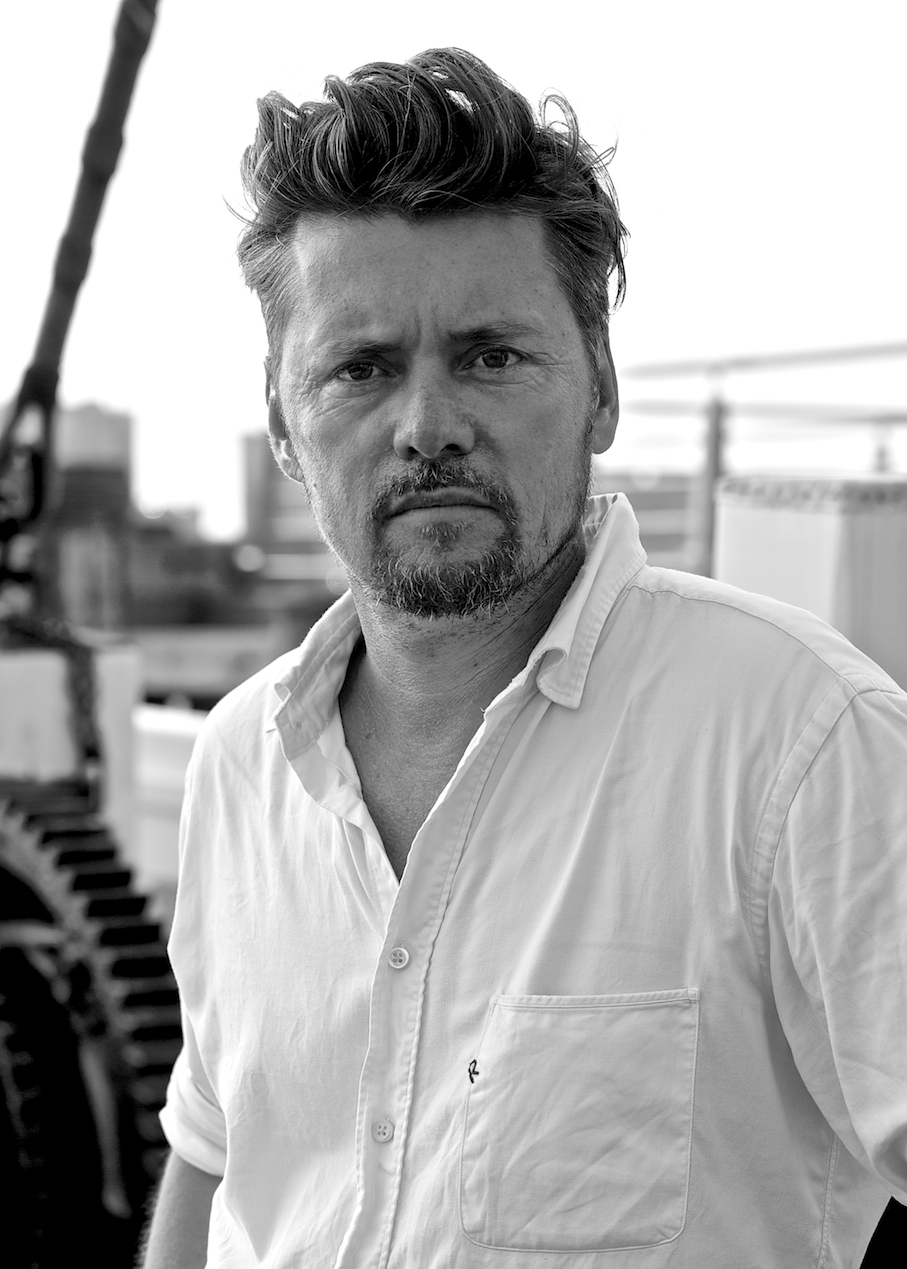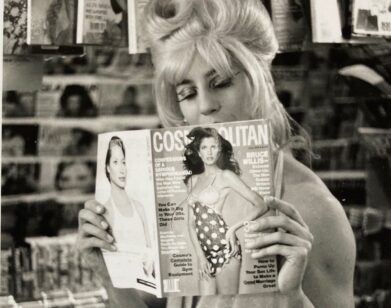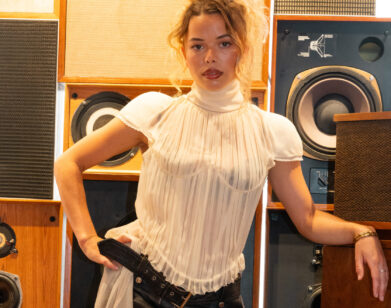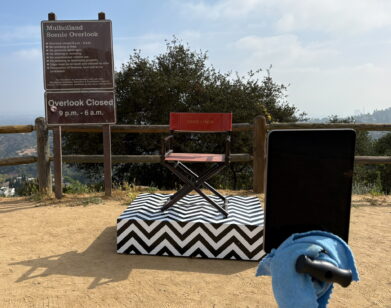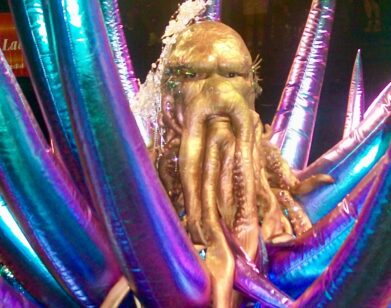On a Boat with Mark Firth
This has been good month for veteran restaurateur Mark Firth, not least because it has involved two of his favorite things: oysters and soccer. FIFA World Cup craze has been sweeping the nation, but between soccer games Firth has been multitasking on his latest restaurant, Grand Banks, set to open off the coast of Manhattan this week. Located on a renovated oyster fishing schooner called the Sherman Zwicker, the joint will specialize in the mollusks it was originally dispatched to catch.
Docked off Pier 25 near Tribeca, the 142-foot-long, 72-year-old vessel houses a couple dozen tables, affixed to the deck. Firth will gear ever-changing menus towards local seafood, emphasizing a steady stream of oysters harvested around New York State. On board there’s a wine cellar stocked with natural reds and whites from nearby small-batch wineries.
While a floating eatery is new to him, Firth’s been an avid proponent of local and sustainable ingredients throughout his career, ever since he founded Williamsburg’s Diner with fellow Odeon alum Andrew Tarlow. “You don’t plan to do it,” explains Firth, on catching the local and sustainable food movement early on. “But when you start using a local farmer who grows his own vegetables, and a guy who’s raising his own grass-fed meat, and using natural wines with no pesticides… It’s the natural progression. Why would I be buying frozen fish from China when this person is fishing here, getting it from locals?”
Loyal to the region through and through, the restaurant draws on New York’s long history with its waterways and fishing–and, yes, oysters. “[In New York], along with lobster, oysters were the opulent poor person’s food. Everybody ate oysters,” says Firth. “Then it changed over the years to a fancy thing. But it really was for the people.” On deck, coiled ropes, distressed wood and a clear view of the Hudson keep a seafarer feel.
Firth’s own past is a compelling history itself. Born in Zambia to English parents, a teenage Firth dropped out of college and wound up chasing sporting events around Europe. Eventually settling briefly in Florence after the 1990 World Cup, he picked up cooking out of necessity. “I cooked almost every night, because you can just go to the farmer’s market there and fill your bag up for $10 and serve six people,” he remembers. “My friends were all students and poor.” By September 1994, following the World Cup in the United States, he found himself in New York, and soon got a gig as a waiter at Keith McNally’s Odeon. “Wherever I went, when you don’t have a degree or real skills apart from making drinks, you tend to end up in the restaurant business,” he jokes. It was there he met Tarlow, and the two opened Diner four years later. Next came Marlow & Sons in 2004, then Marlow & Daughters. The empire they cofounded now includes Roman’s, Achilles Heel, and the Wythe Hotel.
But in 2009 Firth decamped with his wife, a former photographer’s assistant, and their two children to the Berkshires in Massachusetts, telling Bon Appétit he “needed space.” He started a farm with livestock, crops and areas good for foraging nearby. From there, he founded his most recent restaurant prior to Grand Banks, The Prairie Whale, where he was revving up for the next soccer match when we called last Thursday.
RACHEL SMALL: What’s happening there right now?
MARK FIRTH: We had about 100 people watching the USA-versus-Germany game [earlier this afternoon], so that was fun. So we’re trying to clean up the mess for that, and get ready tonight for Algeria-versus-Russia game.
SMALL: That’s a fun mess.
FIRTH: I’m a big soccer fan, so it’s fun for me. I root for England, but we’re rubbish, so…
SMALL: Oh, well. You’re opening a restaurant on a boat. That’s really awesome. How did you find this boat and turn it into Grand Banks?
FIRTH: Alex [Pincus, in charge of Grand Banks’s development and design] owned this sailing school with his brother, and then they sold that, and Alex moved up to the Berkshires, where he lived two miles from me. So we started going to the gym together and we would talk. He’s always looking for things and I’m always thinking about business ideas–nine irons in the fire right now. The one thing we thought would work is this idea of oysters… the fact that New York’s waterfront is so underused. How could we do it? The first ideas were something like a barge with shipping containers that we would cut out so one would have an oyster bar, one would have a bar in it. I suppose it was too industrial. It didn’t appeal to us and it also felt too permanent. Something beautiful about the schooner is you could just cast off the rope and leave and take your restaurant with you. When they found the boat, it fit exactly that idea.
SMALL: It’s still seaworthy?
FIRTH: Yeah, totally.
SMALL: For all we know, next summer could be at a totally different pier.
FIRTH: Somewhere completely different.
SMALL: Were there any New York laws that you had to deal with in opening the restaurant on the boat?
FIRTH: So far, not. They haven’t come up yet.
SMALL: Don’t tell anyone about it.
FIRTH: What we don’t mention we’ll get away with. So far it’s been pretty much the same as opening any regular restaurant. Regular licenses. You can’t just roll up and start selling booze.
SMALL: Oysters are a mainstay of the menu. Why oysters?
FIRTH: The history of oysters and New York was great. [Lower classes] used the shells for roads and house foundations, but then the water got more and more polluted. Oysters became more exclusive then and more expensive, [attainable only from] places with cleaner water. I’m kind of obsessed with oysters. Soccer and oysters.
SMALL: Do those two go well together?
FIRTH: Yeah, they’ve been going great. Eating my dozen oysters every night while watching soccer for the last two weeks.
SMALL: I feel there would be a goal and I’d swallow my oyster too quickly in excitement and choke to death.
FIRTH: I’d never heard of anyone choking to death on an oyster. I think they’d be too slippery. You’ll be all right! Not going to happen. Don’t eat a steak while watching the USA play. You’ll choke on that.
SMALL: When people go into Grand Banks, generally, what will the experience be like?
FIRTH: I think people are going to expect it to be a huge boat, but it’s not. It’s 140 feet, so it’s going to be cozy. But also, because it’s such an old boat, too, it has a nice rustic old nautical feel. It’s not sleek, or a gem palace. It’s a workboat that’s been repurposed. It’s not going to be like going to Per Se the first time and thinking “Woooooow… the opulence.” Gritty is the wrong word, but I don’t know… You’ll have to go.
SMALL: “Sailor’s life,” maybe.
FIRTH: Yeah, a little. With captain’s hats.
SMALL: What made you choose to move up to the farm?
FIRTH: A new challenge. Maybe challenge is the wrong word, but I just needed a different outlook. I have two young kids. We all moved up here, and they love their school. I bought a farm and have pigs and chickens and sheep. I wanted to become a farmer and try something different. It’s been going great. I had eight lambs this year. I’m trying to build a flock! Now I have 12 sheep. I started with three.
SMALL: What has being a farmer has taught you about being a chef, and vice versa?
FIRTH: Basically, if I don’t know where it’s from, I can’t eat it. There are so many horror stories about where food comes from. Animals treated so, so badly. Who’s feeding what to whom. It’s horrible. I have a raw egg from my chicken coop every morning with blueberries and raw milk. I know here where everything comes from. It’s a nice feeling. Being able to go to the woods with a little bag over your shoulder with berries and mushrooms and ferns and everything out there that is free. Being able to make a menu like that, with a pork chop from the pig that you raised. That’s the way to go for me.
SMALL: Do you remember the first oyster you shucked?
FIRTH: Hmmm. I think I stabbed myself in the hand. [laughs] But I only did that once. It becomes something quick after you’ve done about five, and then you find the seam and the hinge. And then, boom. Once you got that, you’re good. You might slip and stab yourself in the hand, but whatever.
SMALL: Job hazard, whatever.
FIRTH: There’s definitely a transition moment, an a-ha moment, when you realize, “Oh, I’m a good oyster-shucker now.”
SMALL: Is Grand Banks going to be accessible when it gets cold outside?
FIRTH: A friend of mine in London is designing blankets for us for the boat. Paul Vogel. He’s the greatest. I met him in Italy in 1990, where he was studying textile design. He comes through New York four times a year and we see each other whenever he comes over. He mentioned, “I’m doing a whole new line of blankets and sheets and bed linens.” And I said, “Design us blankets for the boat!” As soon as it gets chilly, people will want a little blanket on their laps. So that’s what he’s doing.
SMALL: Will there be ice bobbing around?
FIRTH: We’ll stay with the warm weather. We’ll probably leave in the end of September, early October. We haven’t decided where to go next. My vote is Key West, but we’ll see. New Orleans would be a lot of fun. Where did you grow up?
SMALL: I grew up in Chicago.
FIRTH: There’s a big lake there, right?
SMALL: There’s a lake. You should totally take it to Chicago!
FIRTH: Put it on a flatbed, drive it over. Maybe we’ll do offshoots. Grand Banks II. We’ll be like the McDonald’s of oyster bars.
SMALL: I would be so appreciative of that. Speaking generally from start to finish, what experience would you like people visiting Grand Banks to have?
FIRTH: Honestly, I’d like them to learn about something about New York and the history of the oysters and how the bushel had been a huge part of New York’s development. But also have a nice, relaxing, simple meal with a nice glass of wine. And see the view. The view is amazing. Good place to be a date. You know? People I know now who are married said they had their first date at Diner. This is a floating version of Diner.
SMALL: Are those people still together?
FIRTH: Yeah, and people tell me all the time. People told me at the Prairie Whale two weeks ago that they had their first date at Diner. It’s cute.
SMALL: In general, what is your philosophy on the service in different restaurants? It seems like you want it to be a little bit more of a homey, relaxed atmosphere. How are you approaching that?
FIRTH: I think that in the service industry, we serve, but the people who work in restaurants in New York are a very, very intelligent bunch of people. You have painters, actors. Everybody can come to New York and pursue their career, but make their rent doing tables. New York as a clientele appreciates that. There isn’t this “serve me” kind of feeling. Obviously you’re there to do your job and wait tables and do a good job at that, but I don’t feel that there’s such a huge gap of the people being served and the people doing the serving. And that’s what I like: I like to keep that feeling that we’re all in this together. Obviously I want to do a good job and serve you well, but at the same time I don’t stand for people talking down to the servers or having unreasonable demands. There’s no room for that in my restaurant. You show respect, we show respect, everybody has a good time. That’s how it should be.
SMALL: What’s the best advice you’ve received?
FIRTH: What I really appreciate is that a lot of well-known chefs and restaurant owners have been coming to the Prairie Whale and they come back often and that, for me, is a great compliment. But also the best compliment… something that really inspired me a long time ago, I saw Dan Barber who owns Blue Hill. He was on a date at Marlow. And I said, “Oh, you’re Dan.” I’ve been to his restaurant and saw all of his talks at NYU. I’ve been to those talks. He was a big influence for me. And he was like, “Oh, I recognize you, you were at the lecture two weeks ago. This is my favorite restaurant.” That made my life for five years. It was a great moment. It gives you the confidence to go on and keep doing what you’re doing. But also someone said to me once, and this is really smart, “You’re only as good as your last meal.” The service and the food. You can’t say Dan Barber, seven years ago, told me that Marlow was his favorite restaurant. He needs to say that every time he comes in. Across the board, it’s not about pleasing him, it’s about pleasing everybody and keeping your eye on that.
SMALL: Although it doesn’t hurt to please Dan Barber.
FIRTH: Totally. But if you have a bad experience after seven great experiences, that experience hurts all the more. So that’s just trying to stay consistent. That’s the hard part. You can pull off an amazing meal every so often, but staying consistently good, giving a good, honest product with good service–it’s really hard to keep that up.
SMALL: How do you accomplish that?
FIRTH: I think having integrity in what you buy in the restaurant–the people you source your food from, keeping money in the community and not going for the cheaper option when you can, even if people may not notice. That kind of thing. And treating your staff like how you would want them to treat your costumers–that’s really important. Treating people with respect is a major thing. And it’s a stressful business, the restaurant life. I’m not saying I haven’t turned around and yelled at someone to pick up the pace, but at the end of the night I say, “Great job; this is where we went wrong, this is how we can be better.”
GRAND BANKS IS NOW OPEN AT PIER 25 IN NEW YORK CITY.

